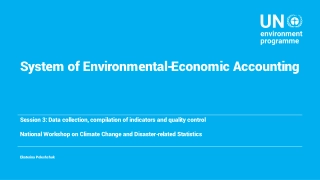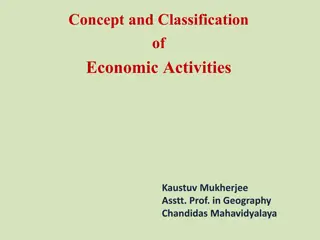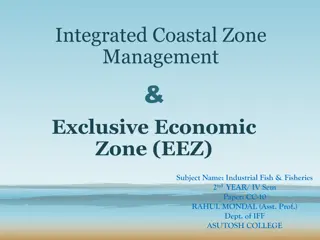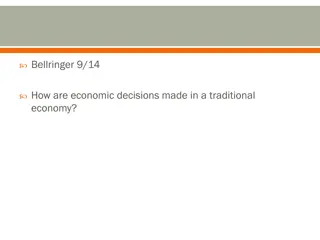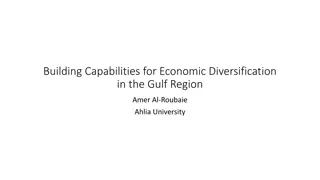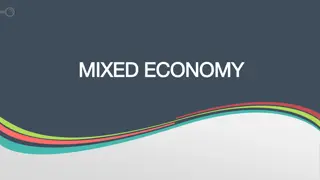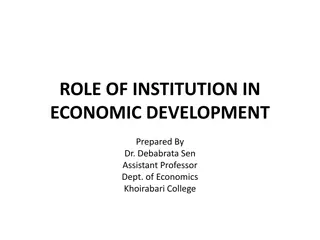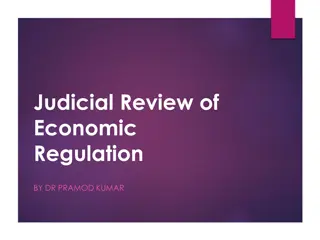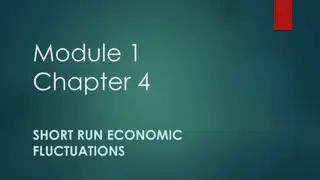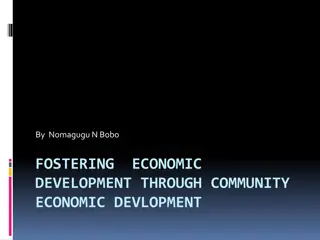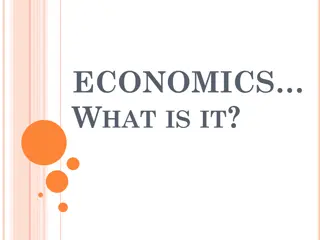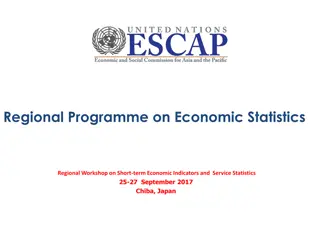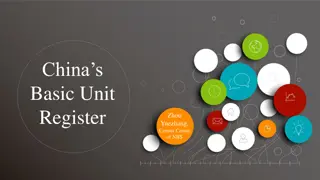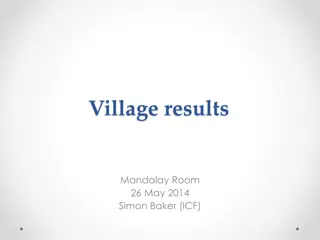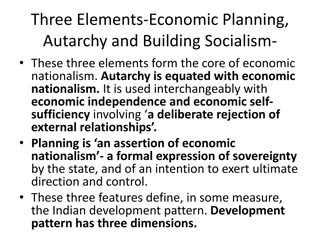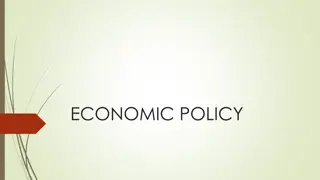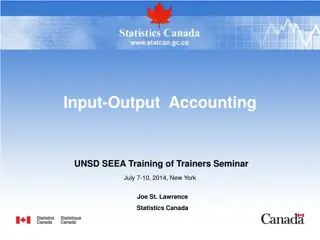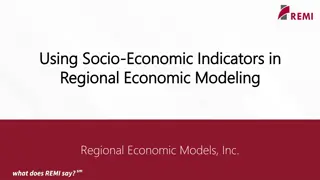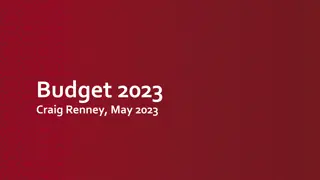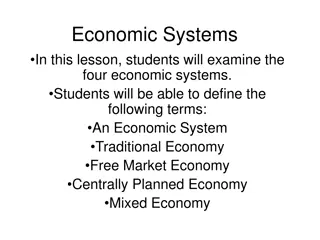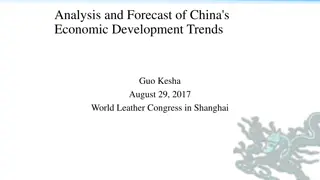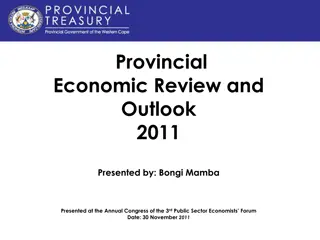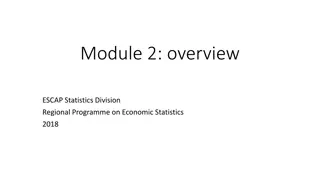Understanding the System of Environmental-Economic Accounting (SEEA)
The System of Environmental-Economic Accounting (SEEA) is a framework that combines economic and environmental data to offer a comprehensive view of the connection between the economy and the environment. It includes standard concepts, definitions, and classifications for producing internationally c
108 views • 11 slides
2023/24 Annual Performance Plan Presentation for Small Business Development Department
The presentation outlines the 2023/24 Annual Performance Plan of the Department of Small Business Development, covering situational analysis, global economic outlook, performance priorities, game-changers program, alignment with economic recovery plans, institutional program performance, key risks a
27 views • 59 slides
Understanding Economic Activities and Their Classification
Economic activities encompass the production, distribution, and consumption of goods and services within a society. Economists classify economic activities into four main sectors: Primary, Secondary, Tertiary, and Quaternary, each with distinct roles and functions. The Primary Sector involves raw ma
5 views • 12 slides
U.S. Virgin Islands Economic Development Authority Webinar: Small Business COVID-19 Resources
The U.S. Virgin Islands Economic Development Authority held a webinar focused on providing resources and assistance for small businesses impacted by COVID-19. The agenda covered the overall economic impact, reliable resources, SBA Economic Injury Disaster Loan (EIDL), and the tourism industry. Speak
0 views • 13 slides
Integrated Coastal Zone Management & Exclusive Economic Zone (EEZ) - Sustainable Coastal Management
The coastal zone is a vital area where land and sea interact, presenting dynamic challenges and opportunities. Integrated Coastal Zone Management (ICZM) is a science-based approach to managing coastal areas, aiming for sustainability by balancing environmental, economic, and human activities. ICZM,
0 views • 10 slides
Understanding Secondary Economic Activities in Lahore College for Women University
Economic activities are classified into five types, with secondary activities involving the processing of raw materials into industrial products. This sector, including manufacturing and industry, plays a crucial role worldwide. Examples of secondary activities range from metalworking to textile pro
4 views • 18 slides
Economic Systems in the United Kingdom, Germany, and Russia
Economic decisions in traditional economies are based on customs and beliefs. The United Kingdom has a mixed market economy with a focus on service industries, while Germany's economy is export-based. Russia's economy leans towards a command system. By comparing these economic systems, one can see h
0 views • 11 slides
Understanding Key Concepts in Economic Geography
Economic Geography is a sub-discipline that utilizes a geographical approach to analyze the spatial distribution of economic activities at various scales. It focuses on the location of economic activities and their relationship with the environment, encompassing primary, secondary, and tertiary sect
1 views • 20 slides
Enhancing Economic Diversification in the Gulf Region
Economic diversification in the Gulf region is crucial for sustainable growth and development. Productive capacities, defined as the resources and capabilities enabling countries to produce goods and services, play a key role. Economic diversification involves shifting towards a varied structure of
0 views • 13 slides
Understanding Mixed Economy: A Balanced Economic Model
Mixed economy combines elements of socialism and capitalism, allowing both public and private sectors to coexist. Government intervention aims to achieve a balance between individual initiatives and societal goals, promoting economic development while addressing inequalities. Features include econom
0 views • 15 slides
Role of Institutions in Economic Development: A Comprehensive Analysis
Understanding the significance of institutions in economic development is crucial, as they play a pivotal role in shaping societal, political, and economic relations. Institutions, defined as established customs or practices, act as the rules of the game that structure human interactions. Their qual
0 views • 13 slides
Economic Perspectives on Malaria Control and Elimination
Analyzing malaria control and elimination from an economic standpoint is crucial for understanding the long-term health outcomes, cost savings, operational strategies, funding gaps, and wider economic consequences of the disease. By examining the correlation between malaria and poverty, exploring fu
4 views • 21 slides
Understanding Economic Substance Presentation in International Business Units
The presentation focuses on the Economic Substance Act (ESA), outlining the scope of resident companies under ESA, relevant activities requiring annual declaration, the Economic Substance (ES) test criteria, outsourcing possibilities, and the Reduced ES test for specific holding companies in Barbado
4 views • 13 slides
Understanding Economic Development: Measures and Indicators
Economists measure economic development using indicators like the Human Development Index, life expectancy, birth rate, mortality rate, and GDP per capita. Different levels of development are associated with specific economic activities, from primary industries like agriculture to quaternary activit
0 views • 11 slides
Understanding Economic Systems and Their Impacts
Explore traditional, command, and market economies, and how they address economic questions. Understand the concept of mixed economies and their placement on a continuum between market and command systems. Compare economic systems in Israel, Saudi Arabia, and Turkey. Delve into essential economic vo
0 views • 17 slides
Data Room at Banco de Mexico: Enhancing Data Sharing for Economic Research
Banco de Mexico has been gathering granular data on financial transactions since the mid-1990s to monitor compliance, risks, and economic interactions. The creation of a Data Room allows for efficient and secure data sharing, contributing to economic research and analysis. The Economic Microdata Lab
3 views • 12 slides
Judicial Review of Economic Regulation: A Case Study
Courts have limited scope in reviewing economic policy matters unless decisions are arbitrary, mala fide, or violate laws. A recent case involving the Small Scale Industrial Manufacturers Association vs. Union of India showcases the challenges of judicial review in economic distress situations cause
0 views • 15 slides
Understanding Trade Cycles: Economic Fluctuations and Phases
Trade cycles, also known as business cycles, are fluctuations in economic activities, affecting employment, output, income, prices, and profits. These cycles consist of phases including depression, recovery, prosperity, and recession. During booms, economic activities peak, while recessions see a sl
7 views • 7 slides
Economic Impact of COVID-19 Pandemic on Business in Rwanda: VAR Model Analysis
The study investigates the effects of COVID-19 on business start-ups, money supply, lending interest rates, international trade, savings, investments, and economic growth in Rwanda using a VAR model. The research highlights the changes in economic activities due to the pandemic and explores the impa
0 views • 10 slides
Fostering Economic Development Through Community Economic Development
Community Economic Development (CED) involves local actions to create economic opportunities improving social conditions, especially for the disadvantaged. It recognizes the interdependence of economic, environmental, and social challenges, emphasizing solutions rooted in local knowledge. The ultima
1 views • 30 slides
Understanding Irish Economic History Since Independence
This topic delves into the economic evolution of Ireland since gaining independence, exploring key milestones such as shifts from globalization to autarky, and from autarky to globalization. It also discusses the economic structures of different decades, offering a comprehensive view of Ireland's ec
1 views • 44 slides
Understanding Economic Systems and Questions
Explore the concepts of traditional, command, and market economies, and how they answer key economic questions. Learn about economic systems in Canada, Cuba, and Brazil, and grasp the fundamental economic questions of what to produce, how to produce, and for whom to produce. Understand the basics of
0 views • 26 slides
Enhancing Economic Statistics in Asia-Pacific Region
The Regional Programme on Economic Statistics aims to improve economic statistics in the Asia-Pacific region by enhancing capacity and coordination among National Statistical Offices (NSOs) and other stakeholders. The programme focuses on implementing the Core Set of Economic Statistics to facilitat
0 views • 11 slides
Understanding China's Basic Unit Register
China's Basic Unit Register is a database containing essential information of legal entities and industrial activity units engaged in economic and social activities in China. It plays a crucial role in economic statistics, providing data on economic activities, social impact, and statistical integra
0 views • 14 slides
Socio-economic Data Analysis of Selected Villages in Mandalay
This report presents detailed socio-economic data from selected villages in Mandalay, including information on ethnicity, religion, socio-economic background, availability of electricity, civil society groups and activities, source of credit, and water sources. The data provides insights into the de
0 views • 8 slides
Understanding Australia's Economic Development and History
Explore the economic future of Australia through units focusing on financial literacy, government structure, historical context, and current affairs. Dive into key concepts such as small business initiatives, taxation, colonial history, and governmental systems, all contributing to shaping Australia
0 views • 35 slides
Economic Nationalism and Development Pattern in India
Economic nationalism in India was characterized by the elements of economic planning, autarchy, and socialism. The development pattern focused on capital goods industries, inward orientation, and state ownership. Two interpretations of this pattern were influenced by economic theory and Marxist pers
0 views • 13 slides
Overview of Economic Policy: From Mercantilism to Present-Day Practices
Explore the concept of economic policy and its importance in achieving economic objectives. Delve into the historical debate on state intervention in the economy and major schools of economic theory like Mercantilism. Understand the emergence of economic policies through economic, political, scienti
0 views • 105 slides
Overview of Input-Output Accounting and Economic-Environmental Integration
This content provides insights into input-output accounting, flow accounting, environmental-economic integration, and the integration of economic data. It covers topics such as the economy, natural resources, sector-wise analysis, flow of goods and services, and the relationship between supply and d
6 views • 23 slides
Economic Analysis of a Country's Economy over the Last 20 Years
Exploring a country's economy over the last two decades involves analyzing its main industries, export products, economic growth rate, unemployment rate, inflation rate, current interest rate, and GDP per sector. Understanding these factors can provide insights into the country's economic strengths
0 views • 8 slides
Analyzing Socio-Economic Indicators in Regional Economic Modeling
Analysts utilize regional macroeconomic models to assess the impact of policies on various economic factors including employment, income distribution, and workforce demographics. REMI-SEI framework focuses on understanding the distributional effects of regional economic policies to offer broad-based
0 views • 32 slides
Budget 2023 Summary: Political, Economic, and Fiscal Highlights
The Budget 2023 by Craig Renney in May covers a range of critical areas including Political Background, Economic Outlook, Fiscal Outlook, and Spending Highlights. It reflects the challenges faced by the government amidst an impending election and economic uncertainties. The economic forecast is more
0 views • 11 slides
Anticipatory Approach to Economic Theory - Highlights and Critiques
Critiques of conventional economic thinking include its ahistorical approach, lack of focus on social issues, and uniform policy recipes. An alternative, anticipatory approach to economic theory emphasizes the role of uncertainty in driving change and transforming economic institutions. It explores
0 views • 6 slides
Understanding Economic Systems: An Overview
Explore the four economic systems - Traditional, Free Market, Centrally Planned, and Mixed Economies. Learn how societies produce and distribute goods and services and address key economic questions. Discover the differences between economic systems and the importance of answering key economic quest
0 views • 15 slides
Analysis and Forecast of China's Economic Development Trends - Guo Kesha Presentation
The presentation by Guo Kesha at the World Leather Congress in Shanghai delves into the analysis and forecast of China's economic development trends. It discusses whether a new cycle has opened for the Chinese economy, the potential for an L-type growth platform, and initial research on economic tre
0 views • 22 slides
Georgia Department of Community Affairs CDBG Economic Development Programs Overview
Georgia Department of Community Affairs manages various CDBG Economic Development Programs including Employment Incentive Program, Redevelopment Fund, and Set-Asides. These programs aim to support economic growth, job creation, and community revitalization in the state. Local governments can access
0 views • 38 slides
Economic Review and Outlook 2011: Global Trends and Regional Impacts
The Provincial Economic Review and Outlook for 2011 highlighted the global economic performance and outlook, focusing on factors like GDP growth, employment trends, and socio-economic conditions in the Western Cape region. It discussed the recovery in global economic growth post-2009, with the IMF p
0 views • 29 slides
Importance of Inclusive Economic Growth and Governance in Rwanda
Inclusive economic growth is crucial as it offers economic opportunities and equal access, enhancing poverty reduction efforts. Societies thrive when based on equality, promoting better development outcomes. The qualities of government for economic growth encompass economic liberalism, democratic pa
0 views • 28 slides
Developing Brief Economic Commentaries for Cochrane Intervention Reviews
End-user decisions benefit from the inclusion of economic perspectives in Cochrane Intervention Reviews (CIRs). This summary explores the importance of incorporating economic evidence to enhance the applicability of reviews, without substantial additional resource burden. Topics covered include cost
0 views • 40 slides
Understanding Economic Statistics: Module 2 Overview
Exploring the fundamentals of measuring an economy through economic statistics, this module covers the Sustainable Development Goals, 2008 SNA framework, and uses of macro-economic data sets. It delves into the activities within an economy, the importance of measuring economic activities, and the Sy
0 views • 42 slides
